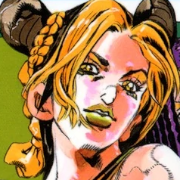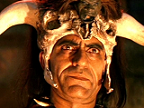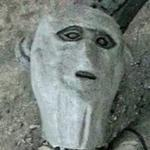|
Rody One Half posted:not only should we Support Dacia as a buffer, we should be looking to restoring the liberty of Rome and, if and only if that's achieved first, even Egypt. Carthago. Delenda. EST. Yes, push back these large nations in order to preserve our future safety.
|
|
|
|

|
| # ? Jun 8, 2024 04:10 |
|
protec dacia
|
|
|
|
Rody One Half posted:not only should we Support Dacia as a buffer, we should be looking to restoring the liberty of Rome and, if and only if that's achieved first, even Egypt. Carthago. Delenda. EST. Pushing into Italy is semi-feasible logistically, though our ability to take Carthage on directly in the field is questionable - as shown in the Gallic war, having short supply lines can be a crucial advantage. That said, in-game our horse archers are actually semi-effective against war elephants, only taking a -20% strength malus (other heavy hitters like heavy cavalry and chariots only do 50% damage, though heavy infantry and archers don't have any malus whatsoever) - once our nobles stop freaking out about them, the core tactic of 'stay away while pelting with missile fire' does not require enormous tactical nous. On the strategic level we'd be completely outclassed - we can't even take on the Gallic 'fleet' of glorified fishing boats, so we'd face regular naval invasions while being completely unable to respond in turn without our fleet turning into flotsam and toothpicks. Sidenote on general playstyle: Realistically, I could probably try to bait the AI into repeated isolated landings and defeat them that way, but that feels cheap (I was glad the Gauls only attempted the one landing, despite having won naval supremacy), so I won't be doing that for the same reason I won't monostack one hyper-buffed type of MAA come CK3/make space marines in EU4 - having AI around who can actually pose existential threats provides reason to actually pay attention outside my own garden, giving me reason to notice characters like Arishet (who, if her family sticks around, is getting an imperial election bonus bloodline in CK, and I'm tossing up whether her bloodline should unlock absolute cognatic or whether Punic culture generally should get it - leaning towards the latter). Plus, having a big Mediterranean empire to blow up with migrations in CK2 when they'll be unable to protect their waters will be *fun*. I am still trying to play 'successfully', though - the main effect this has had so far is in me attempting to assassinate various petty/wrathful rulers' rivals and other RP-style decisions, I haven't been intentionally throwing wars/have been trying to avoid civil wars.
|
|
|
|
Protect Dacia
|
|
|
|
|
Protect Dacia
|
|
|
|
I think we should protest Dacia.
|
|
|
|
protect Dacia
|
|
|
|
Hellioning posted:I think we should protest Dacia. Hidden Punic spotted! Protect Dacia. Are they nomads like us? Let's marry them and take their horses.
|
|
|
|
12: The Light of Knowledge The Astartian Plague had been a traumatic event for the entire Mediterranean, and the resurgence of plague in Neapolis, the worst-hit city in the days of King Astarte, was met with terror and dismay, as trade and commerce once again ground to a halt, with ships being turned away from harbors and merchants finding cities gates shut to them on their arrival. In one particularly concerning incident, the Gorizont, a Scythian ship hailing from Korinth, short on water and desperate for a berth, made a desperate attempt to dock at the grand Cothon in Carthage despite repeated warnings to reverse course and sail elsewhere. The punic sea-guard rammed it with a galley and set the ship ablaze, leaving the crew to burn or drown within sight of the city walls, on which it was later said the screams and curses of the Scythian sailors could still be heard on cold nights in the years following. In Scythia, similarly punitive measures were taken -Tanais, hopeful that it would receive the same blessing and fortune it had in Astarte's time, closed its gates to travelers to the East. Kanthake II surrounded himself with philosophers and soothsayers, seeking wisdom and counsel on how best to combat the quick-spreading sickness. On their counsel, mass burial pits and crematoriums were established some distance from towns, and the corpses of all those 'known or suspected' to have died of the plague were ordered to be interred or burnt there - without funeral rites.  The disruption to food distribution caused by the plague left many starving in urban areas, with cities seeing mass-migration to the countryside Kanthake appears to have been genuinely taken aback when the Christian community, which he saw himself as the protector and champion of, objected strenuously to the practice of mandated cremation, with them claiming it was a potential impediment to the bodily resurrection. While his Christian wife was credited with the 'dispensation' which was granted to permit any 'Christ-follower' to be buried in a pit rather than burnt, it appears to have been a purely reactive measure - with the realm ravaged by plague, Kanthake could ill-afford the civil unrest annoying the Christian community and their international merchant allies would cause. The 'betrayal', however, clearly rankled at him - when one slave in Ghart objected to the practice of cremation being used at all, claiming that it would leave souls to wander the earth, abandoned and desolate without a body after the second coming of the Christ, Kanthake pronounced the preaching ‘treason’, which fell outside the traditional protections for Christians and had the slave crucified.  Despite the lengths to which Kanthake was going, both him and the other great kings proved ultimately unable to stem the tide - no matter how many merchants were turned away, sunk, or burnt, not matter how many and how quickly corpses were interred, the plague seemed unstoppable, spreading south, east and west. The merest rumor that a port had a plague outbreak was enough to see its merchants turned away at every port if they were lucky, as the incident at Carthage demonstrated the lengths ports would go to preserve themselves against contagion. The hellenic peninsular, long a epicenter of local trade across the punic sea, saw its merchants returning home empty handed, impoverishing the cities even before the plague touched them. ooc: the plague effects nerf a province's trade routes to 0, meaning you can track it via these somewhat spammy pop-ups and the revolt risk mapmode.  While the plague could not be stopped, however, the ruthless actions Kanthake and his court philosophers had promoted proved highly effective at halting the death toll where they were implemented. Where the Astartian Plague had seen a full fifth of the Scythian population starve or perish, Kanthake’s ruthless restrictions on the handling of the dead, and boarding up and sealing off of entire towns ensured that what damage there was was restricted to the cities, rather than spreading unchecked across the hinterlands as it had in Astarte’s day.  Scythia, before and after the plague. The cities which were hit, however, were hit hard. Neapolis in particular was emptied, with those able to bribe the guards and leave doing so, memories of the years of cannibalism, banditry, and riots still seared into the population's consciousness. Tanais also suffered significantly, losing well over a third of the population and much of its wealth - the closing of its gates to Eastern travellers reverberated far to the East, shaking the merchants of Cathay’s confidence in the western markets and immiserating the nomadic polities which profited off the Silk Road, much of which fell back into the arms of the Kushan or began migrating west to richer pastures. Seeing the city decline, and citing the previous shift from Neapolis to Tanais itself as justification, Kanthake II moved the court southwards to Pella.  Neapolis was particularly damaged by the plague, left with barely a tenth of its population  Tanias was also significantly hit by the plague, especially with the cessation of trade to the far east  Pella, the least affected metropole, was a natural choice for a new capital by Kanthake Kanthake’s reign in his new capital was inaugurated by the construction of a grand public square in the centre of town and a equally large expansion of the shipyards on the coast of the Macedonian Gulf, seeking to restart the trade and commerce that had been shut down by the plague, especially with the Levant (trade relations with the west still being somewhat strained after the burning of the Gorizont outside Carthage). What began as a trickle of merchants and wise men turned into a flood, with Kanthake’s court filled with mystics and miracle-workers, as well as wealthy christian merchants.   Of all the residents at court, few outpassed Kanthake’s personal favourite, a painter and mystic known as Mani. Originally from Babylon, he had fled the city when the plague had emptied it, and sought refuge in Kanthake’s personal service. Known for his miracle-working, Mani would allegedly levitate, teleport and heal the sick with a touch. The son of a Christian merchant and the daughter of a prominent Druidic family, he claimed himself to be a follower of Christ, although he distinguished himself from the eastern, phonecian rite by claiming that Christ had been possessed by an angel of light at his baptism, and denied the physical resurrection of the dead in favour of the ‘liberation’ of the souls of light every man was imbued with - an interpretation which Kanthake, still angry about the Christian protests over cremation, was known to favour. As Mani gained more royal favour, he wrote and presented his sect’s teaching in series of treatises and letters to disciples, claiming himself to be a prophet sent to reconcile the world’s religions into one, as previous prophets had died before being able to write their own scriptures, leaving it for lesser disciples to misunderstand and misinterpret their teachers’ message - the message Mani now brought in its fullness to the world.  Mani famously cited the destruction and death visited upon Babylon twice in his lifetime as proof that the Creator-deity could not be the One Kanthake’s patronage of such a heterodox sect had greatly concerned and alarmed both the Christian merchant class and the traditional nobility, which saw him as abandoning practical, grounded concerns to dabble in matters of philosophy and religion. On his death, a more traditional, less philosophically minded king was the obvious choice, and that candidate was found in the head of the venerable Ytraim family, owners of extensive holdings in the North. When Gunacamdre took the throne, one of his first actions was to extend protection over Dacia, seeking to ward off future incursions against it by the Punics, the Gauls, or even the lesser Vandal kingdom. Scythian forces, he promised, would be made fully available should any ‘aggression’ be displayed on the western Dacian border.   For the Vandal kingdom, which had just lost some the southern territory it had seized from Dacia before the plague to the resurgent Dacian kingdom, this announcement spelled doom, with the chief being unable to promise loot and spoils from southern raids to his various clients, causing a slow collapse in central authority and the reassertion of traditional rights by many of the Vandalic sub-clans.  Gunacamdre, meanwhile, saw himself as a restorer of the old order - the southern prioritisation shown by Kanthake in his shifting of the capital south to Pella was to be reversed, if possible, and Tauricia, languishing without the eastern traders which had built its wealth, restored and refurbished. In particular, the lands directly east of Tanias saw significantly more development and investment that they had in the past. No longer a mere thoroughfare for merchants, they were turned into productive pastures, farmland and forestry in their own right, with roads and farms turning the wilderness into a granary of the north. This was not unnoticed by the wild men to the north-east, who saw in Tauricia a land of milk and honey - if only it could be taken.  For now, however, the nomads would have to wait - Krayn was built into a true garrison city to protect the farmers of the hinterland, and the ports along the Taurician peninsular refurbished and extended, put to work shipping the the produce and products of the northern settlements southward rather than being vessels for the luxuries of the far east. With trade links re-established, Christian merchants once again began frequenting Tanias and the other northern ports, spreading their faith as they did so.  As for Mani and his sect, Gunacamdre dismissed him from court, leaving him to turn to his devotees for support.Of those, it was one of his most devoted disciples, Amratara, who opened his door to the prophet, offering him food and shelter. While at Amratara’s holdings, Mani produced his final work - a book of pictures, laying out the structure and hierarchy of the heavens and earth in his cosmology, as well as illustrating how the soul may ascend via knowledge - gnosis, in the local term - to the highest realm of light. In comparison, those who were trapped and blinded by the material realm were doomed to see their souls reincarnate over and over in the fallen world, unable to rise beyond it. These teachings drove a further rift between Mani and the wider Christian community, which taught that each soul was individual and would be raised again for specific judgement on the last day. The Christian community - some tenth of the population, by some accounts - successfully pleaded their case to Gunacamdre, who ordered Mani to cease teaching ‘on pain of exile’ and sponsored the growing lesser cult of Andrew, one of the disciples of Christ who was denigrated by Mani for not understandings Christ’s ‘true message’.  The attempted suppression of Mani’s teachings was poorly received by his followers, who turned against Gunacamdre, dismissing him as a man of the material and measurable rather than a true seeker of knowledge. As the cult of Mani spread amongst the philosophical schools - both the Platonic academy at Athens and the eclectic collection Kanthake had assembled in Pella - the ‘Manicheans’ found themselves growing more and more amongst the Scythian aristocracy, who were attracted by the promise of secret knowledge and magics that Mani could reveal. Meeting their master at Amratara’s, secret rituals and initiations were (it was claimed) being conducted, and the true reach of the cultus was unknown to nearly all. Regardless of the true extent of the Elect, as they had taken to calling themselves, the followers of Mani had grown bold indeed - bold enough for Amratara to openly attempt to overthrow Gunacamdre.  While ultimately unsuccessful, the attempted assasination shook Gunacamdre - the Manicheans had grown bold indeed to make such a brazen attempt on his life. The paranoia and concern only grew after one of his retinue was found in an olive grove outside the city, stoned to death in what appeared to be some sort of unknown ritual. Amratara was imprisoned for treason and executed, and Mani brought before the court in chains. While ultimately, it appeared Mani was unaware Amratara had plotted any attempt on the King’s life, his testimony before the court infuriated Gunacamdre, as the prophet proclaimed that the slaying of his ‘living body’ would only free his ‘immortal soul’ to ascend to the realms of eternal light, Mani announcing before the nobles of the realm that death held no fear for the keepers of true knowledge. In the end, it was deemed more expedient to hand Mani over the druids of Galatia for ‘trial’ (and, inevitably, execution), but by then the damage had been done - a new sect had taken root in Scythia.  Question: all our nobles are, of course, loyal to Scythia, to our customs and rules. However, in the matter of faith, it would be good to get a sense of what sects are prominent in our nobles. Note: there’s events I cooked up which can flip major/great powers to manichean or christian - this vote will influence our reaction to them but won’t bind (if they come up, it’ll go to a direct vote), this will just flavour our religious policy going forward. Also note: I will be disabling pagan reformations in CK2, so we are likely to need to convert to a reformed religion - christian, zoro, manichean, or islam (or if things get completely cooked, one of the Indian ones) at some point. There are three major factions: The mercantile, oriental Christ cult, already popular amongst our vassals, a smattering of foreign realms and a notable chunk of the population. They proclaim the resurrection of the dead, and the life of the world to come. There are the old ways - the Heptadic faith, which is becoming more focused on devotion to Tapatī́ under pressure from the monotheists. They offer veneration and acknowledgement to all the lesser and greater spirits, who may otherwise destroy us if left unappeased. And the Manicheans, who are popular amongst the philosophers and some unknown portion of our aristocracy. They are still figuring out what they believe (turns out a cult of philosophers has argumentative tendencies), but preach the light of knowledge. World maps:  
Yuiiut fucked around with this message at 10:54 on Oct 18, 2022 |
|
|
|
It is clear that our toleration of these atheists has caused the old gods to curse us.
|
|
|
|
Which of those options puts us closer to human sacrifices? Those are important.
|
|
|
|
Mani has gifted us with light!
|
|
|
|
Heptadic will serve us for now. the cross and Mani bring plagues, know them by their fruit.
|
|
|
|
My soul will dwell forever in Mani’s domains of light!
|
|
|
|
The Lightbringer, Mani, shows us the way to goodness!
|
|
|
|
We must follow Mani
|
|
|
|
|
The Christians will help bind us to the larger world instead of just looking inwards.
|
|
|
|
Not interested in following anyone called "Manny", but this Christian stuff has promise.
|
|
|
|
Mani is a smart guy, knows secret things
|
|
|
|
Bah. The old ways have worked so far, I see no reason to change things.
|
|
|
|
I'm voting against whatever's most popular because I don't wanna see any one religion get hegemonic.
|
|
|
|
Mani
|
|
|
|
Christianity is the faith of our large Greek populace, to cling to Heptadic beliefs or embrace Manichean teachings is liable to create a civil war in the long run.
|
|
|
|
Listen to Mani, he seems like a cool guy.
|
|
|
|
Mani's the Light!
|
|
|
|
I want to see how Christianity shakes out in this timeline
|
|
|
|
Mani has a point!
|
|
|
|
Mani seems interesting
|
|
|
|
Christianity
|
|
|
|
I say we get with the hip new faith all the kids are talking about these days. Lets go Christian.
|
|
|
|
Christianity
|
|
|
|
Christianity but like... horsey
|
|
|
|
KYOON GRIFFEY JR posted:Christianity but like... horsey "The motif of the Thracian horseman was continued in Christianised form in the equestrian iconography of both Saint George and Saint Demetrius." https://en.m.wikipedia.org/wiki/Thracian_horseman
|
|
|
|
Mani
|
|
|
|
Let's stick with the religion of our forefathers. We are in a very dominant position, obviously our gods are working out for us.
|
|
|
|
There are many faiths, and Mani are correct.
|
|
|
|
There is a reason the old ways have persisted for so long. Why would we forsake them now?
|
|
|
|
Mani Although I do wonder why you're disabling reformation
|
|
|
|
Rody One Half posted:Mani If there was a way to time-limit or tech-gate it to well after the game start it would be less of an issue, but as-is the AI would likely 'reform' the druids, germanics, etc very quickly, throttling the monotheists in the crib (and drowning me in raiders). When we jump to CK3 approx 800-1000AD I'll likely re-enable it provided that pagans are on the back foot enough to make reforming it an impressive/notable feat, but a decent international spread of islam/christianity/manichean/other 'organised' religions will make for a more interesting experience than each realm having its own somewhat bland 'reformed paganism' imo.
|
|
|
|

|
| # ? Jun 8, 2024 04:10 |
|
KYOON GRIFFEY JR posted:Christianity but like... horsey my vote
|
|
|











































